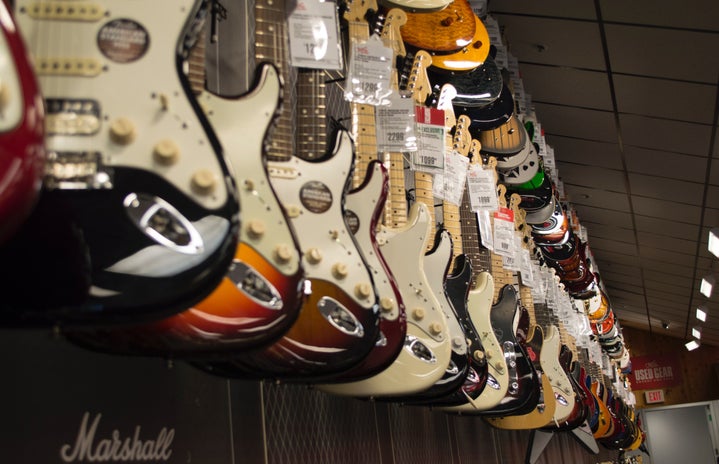Beyoncé has released two new country songs, with plans for a full country album to drop later this year. And while “Texas Hold ‘Em” and “16 Carriages” hold every requisite needed to be beloved country songs–plucky acoustic backing, simple chord progressions, a repeatable chorus, and emotional presence being some key factors–the business behind country is not loving them. Or her.
A country music station in Oklahoma refused to play “Texas Hold ‘Em” after its release and request, arguing that “[they] do not play Beyoncé on KYKC, as we are a country music station.”
But if the institution of country music refuses to embrace Knowles, the people have–and as of February 20th, 2024, she has become the first Black female artist to ever top Billboard’s “Hot Country List.”
For the non-country onlooker, this is to be expected. It’s Beyoncé. Her rise to the top of any chart is to be expected.
But she’s tried before–and failed.
“Daddy Lessons,”, “The Chicks,”, and Bigotry
In her 2016 album “Lemonade,”, Knowles debuted the country song “Daddy Lessons.”. Again, everything about it screams “country.”.
After an instrumental intro and a roaring “yee haw,” a simple drum beat ushers in the story of Beyoncé and her father’s complicated relationship, sung over an acoustic guitar backing–again, following the recipe for a country song, and done to perfection.
The song achieved massive success–but not without angry “cowboys” lining up to make sure the world knew that “Daddy Lessons” did not belong in the country world. Despite this, Knowles performed it at the 2016 Country Music Awards with “The Chicks”–a country group, superstars in the genre by all means, composed of Natalie Maines, and sisters Emily Burns Strayer and Martie Maguire.
With Knowles’ stage presence and “The Chicks’” musicality–you may know them from hits like “Goodbye Earl,” “Wide Open Spaces,” and “Cowboy Take Me Away”– the group blew any expectations there could have been out of the water.
The performance is a powerhouse, a culmination of feminism, musical talent, vocal strength, and one very enthusiastic baritone saxophone player. I’ve seen it maybe 90 times. But, if you notice the crowd, you’ll catch a glimpse of some not-too-happy faces while the women perform. And while it has received its praise, the backlash against it was, like we are seeing with “Texas Hold ‘Em,” a massive culmination of racist and misplaced passion from the mainstream country community.
Maines, the lead vocalist for “The Chicks”, described the anti-Yoncé fervor in a 2021 interview with Howard Stern:
“It was just a weird vibe in that building…we hadn’t done any country award shows or anything since the [2003] controversy.
“It’s the highest-rated 15 minutes in CMA history. And then they start getting, you know, racist assh*les bombarding their website with comments and emails, and whatever, and so they take her down! They took our performance down. And then they got so much bad press, for doing that, within 24 hours they put it back up. Just cowards.”
The controversy Maines is referring to warrants her judgment on the inclusivity of the country music world–and it makes the 2016 CMA’s performance all the more moving. In 2003, eight days after President George W. Bush declared war on Iraq, “The Chicks” (known as “The Dixie Chicks” at the time) commented on the war at a concert of theirs–saying they were ashamed to be from the same state as President Bush. At the time, their song “Travelin’ Soldier,” with lyrics heart-wrenching in memoriam to men killed in combat, was topping the country charts.
“I cried
Never gonna hold the hand of another guy
Too young for him, they told her
Waitin’ for the love of a travelin’ soldier
Our love will never end
Waitin’ for the soldier to come back again
Never more to be alone when the letter says
A soldier’s coming home
—’The Chicks, Travelin’ Soldier'”
To this day, “being Dixie Chicked” is synonymous with being canceled to the point of no return–at least, “The Chicks” didn’t reveal any music to the public for over ten years. For their comment, they were referred to as “Saddam’s Angels.” Country radio stations organized CD-burning protests. In one fell swoop, the conservative side of country music had decimated “The Chick’s” career.
While “The Chicks” have made a jubilant and still, ever-political return–and I fervently recommend their 2020 album “Gaslighter”–the country world’s violent treatment of these women, simply for voicing their opinion, contextualizes the world Beyoncé is entering.
“I made my bed, and I sleep like a baby
With no regrets, and I don’t mind saying
It’s a sad, sad story
When a mother will teach her daughter
That she ought to hate a perfect stranger
And how in the world
Can the words that I said
Send somebody so over the edge
That they’d write me a letter
Saying that I better
Shut up and sing
Or my life will be over?”
—’The Chicks’, ‘Not Ready To Make Nice'”
Outlawing the Outlaw
Not a singularity, but rather, a pattern–when a musician is political, black, gay, or female, or heaven forbid–all four, their road into country music will be one fraught with potholes and barricades.
“Lil Nas X” was removed from the Country Music Billboard list after his twangy country-hip-hop hit, “Old Town Road.” Darius Rucker of “Hootie and The Blowfish” has faced years of racism after his entrance into the country scene in 2008. Now, it’s Beyoncé. For every average-looking, 5’8 white man with a flashy belt buckle, acoustic guitar, and reused melody in the country music world, there’s a marginalized musician who’s been reduced to their skin, or sexuality, or genitals in one way or another.
But why?
What I love about country music–not the country music industry, mind you, but the music, real, genuine, country music, is that it has always been for the downtrodden, the everyday American, for everyone. I am writing this article for the music–I would dismiss the genre, and its bigoted culture, entirely if not for the music.
“There was a big, high wall there that tried to stop me
A sign was painted said “Private Property”
But on the backside, it didn’t say nothing
This land was made for you and me
— Woody Guthrie, ‘This Land is Your Land'”
Country music is everything beautiful and everything ugly about the American experience. It is music grown from the soil of this land, from the tears and the instruments of the enslaved, and cultivated by calloused but caring hands after a hard day of work, into melodies about anything and everything. Heartbreak, love, war. Family, injustice, famine. It is so much more than the overproduced and mind-numbing twang we hear on the radio today.
Country, real country, will make you feel the pain of every farmer who starved in the Great Depression, every wife jilted into an abusive relationship, every beaten-down back during the turmoil of the ’60s and ’70s, every child yearning for their father’s love. And it will make you feel the love of said farmer and wife and child one-thousand times over.
“I wear the black for the poor and the beaten down
Livin’ in the hopeless, hungry side of town
I wear it for the prisoner who is long paid for his crime
But is there because he’s a victim of the times
— Johnny Cash,’Man in Black'”
It can be silly, it can make you want to dance, it can make you want to cry. It can be about nothing at all or everything at once. Country music is worth fighting for, which is why I pray all eyes turn to Beyoncé’s album, and its reception into the gilded and guarded Nashville country music industry, when the time comes. And she has a deep-embedded community of “outlaw” country musicians, and their listeners, to support her.
In the 1970s, in response to the flashy, cookie-cutter world the country industry was becoming, the “outlaw” subgenre and movement aimed to bring country back to what it always has been–music for the common man, the political, the worker. The outlaw. Willie Nelson. Kris Kristofferson. Johnny Cash. All gods in the world of country-folk. All proof that outlaw country can be successful, will be successful.
“And I believe to my soul that inside every man, there’s the feminine
And inside every lady, there’s a deep manly voice loud and clear
Well, a cowboy may brag about things that he’s done with his women
But the ones who brag loudest are the ones that are most likely queer
— Willie Nelson, ‘Cowboys Are Frequently Secretly Fond of Each Other;”
And what’s more outlaw than a black, female pop singer entering the jaded, post “The Chicks’” world of white teeth, dark sunglasses, and bejeweled cowboy boots?
So it goes to say that I await Beyoncé’s album with bated breath. To many, the country music genre is something to scoff at and poke fun. But it’s ours to mold, so we can change that. Bring back the outlaw–and let it be Beyoncé.
“We listen to the radio to hear what’s cookin’
But the music ain’t got no soul
Now they sound tired but they don’t sound Haggard
They’ve got money but they don’t have Cash
They got Junior but they don’t have Hank
I think, I think, I think, the rest is
A long time gone
No, I ain’t hit the roof since I don’t know when
Long time gone, and it ain’t coming back again“
— ‘The Chicks’, ‘Long Time Gone'”


